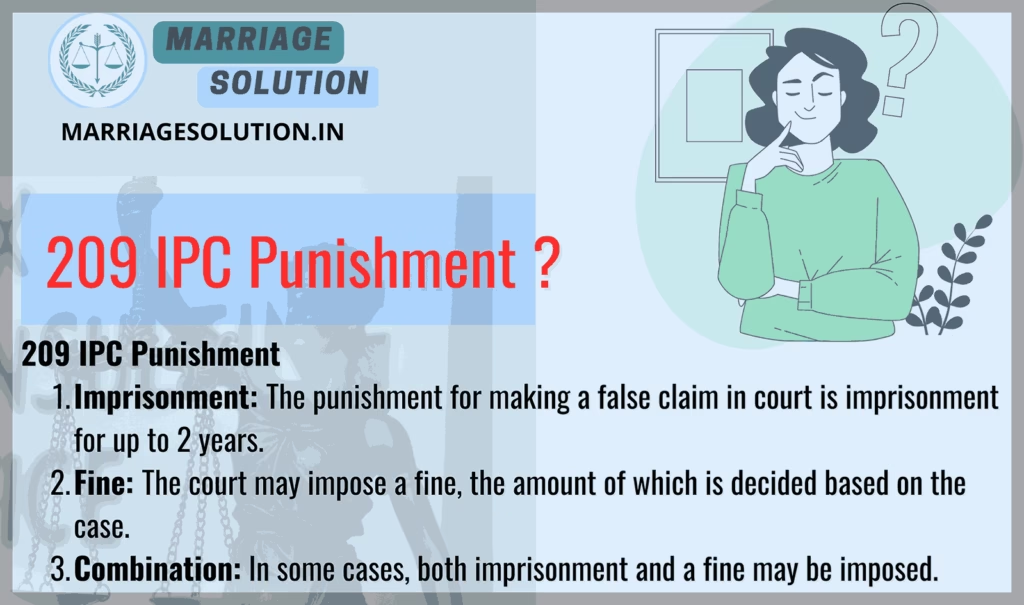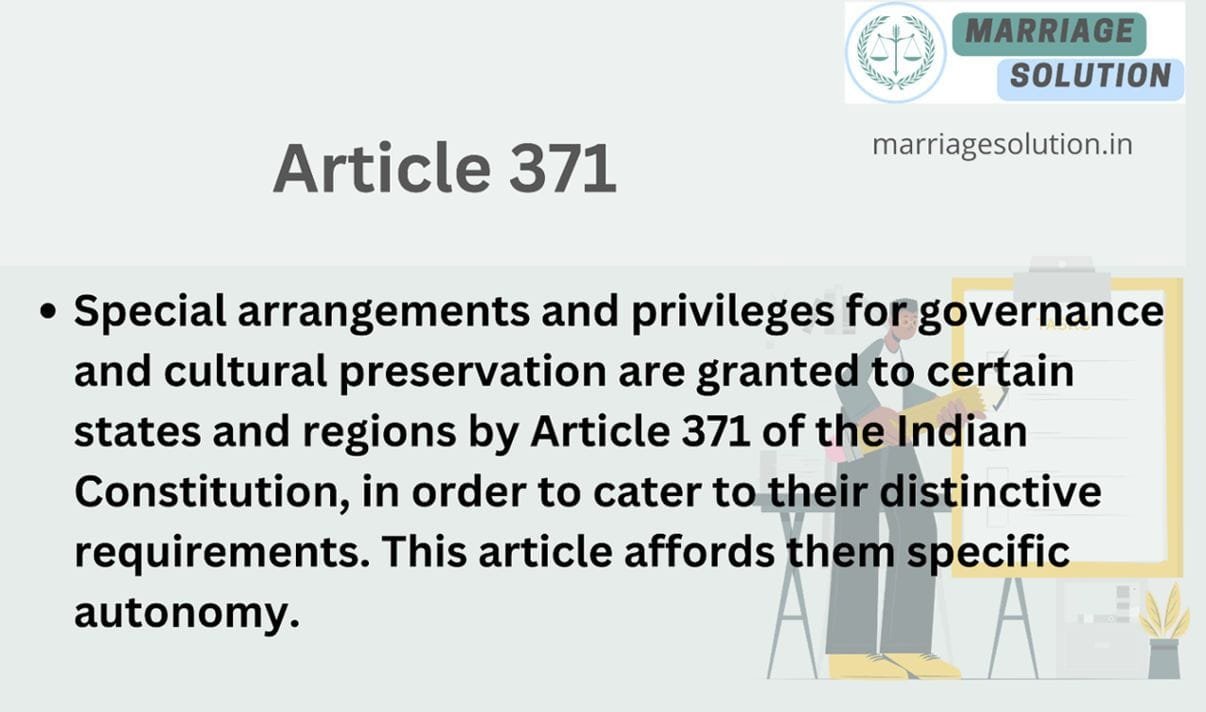Introduction of 209 IPC
209 IPC refers to the section of the Indian Penal Code that penalizes anyone who makes a false claim in a court of law, knowing it to be false. The purpose is to maintain the integrity of judicial proceedings and discourage false litigation.
- Introduction of 209 IPC
- What is IPC Section 209 ?
- IPC 209 in Simple Points
- Section 209 IPC Overview
- Section 209 IPC case laws
- 209 IPC Punishment
- 209 IPC Bailable or non bailable
- Section 209 IPC in short information
- IPC Section 209 FAQs
- If you need support with court proceedings or any other legal matters, don’t hesitate to reach out for assistance.
What is IPC Section 209 ?
IPC Section 209 deals with the offense of making a false claim in a court of law. This law aims to prevent people from misleading the court and wasting its time with dishonest claims.

IPC 209 in Simple Points
Definition of IPC 209
Explanation:
IPC 209 specifically addresses the act of dishonestly making a false claim in a court of law. According to this section, if someone knowingly presents a false claim or statement in court, they can be held liable under this provision. The primary aim of IPC 209 is to maintain the integrity of judicial proceedings by discouraging individuals from presenting baseless or fraudulent claims.
Details:
- Scope: Applies to any false claim made in a court of law.
- Intent: The claim must be made with dishonest or fraudulent intent.
- Knowledge: The person making the claim must be aware that it is false.
Elements of the Offense
Explanation:
For an act to be considered an offense under IPC 209, certain elements must be present. These elements help in determining whether a false claim has been made and whether it warrants legal action.
Details:
- Court of Law: The false claim must be made in a judicial setting.
- False Claim: The claim or statement presented must be untrue.
- Knowledge: The person making the claim must know that it is false.
- Fraudulent Intent: The claim must be made with the intention to deceive or mislead the court.
Punishment Under IPC 209
Explanation:
The punishment for violating IPC 209 is designed to be stringent to deter individuals from making false claims. The legal consequences serve as a reminder of the importance of honesty in judicial proceedings.
Details:
- Imprisonment: The offender can be imprisoned for up to two years.
- Fine: A monetary fine may be imposed.
- Both: In some cases, both imprisonment and a fine may be levied.
Burden of Proof
Explanation:
In cases involving IPC 209, the burden of proof lies with the prosecution. They must establish beyond a reasonable doubt that the accused knowingly made a false claim with fraudulent intent.
Details:
- Evidence: The prosecution needs to provide substantial evidence, including documents and witness testimonies.
- Intent: It must be proven that the accused had the intent to deceive.
- Knowledge: The prosecution must show that the accused was aware the claim was false.
Defenses Against IPC 209
Explanation:
There are several defenses that can be used against a charge under IPC 209. These defenses focus on the intent and knowledge of the accused, emphasizing that not all false claims are made with malicious intent.
Details:
- Lack of Fraudulent Intent: If the accused can prove that there was no intent to deceive, they may be acquitted.
- Good Faith: Claims made in good faith, even if false, may not be punishable.
- Genuine Belief: If the accused genuinely believed the claim to be true, they may not be held liable.
Section 209 IPC Overview
IPC 209 refers to the section of the Indian Penal Code that deals with the offense of “Dishonestly making false claim in Court.” It is a provision that aims to maintain the integrity of judicial proceedings by penalizing individuals who make false claims or statements in a court of law.
10 Key Points Explained in Detail
- Definition of IPC 209
- IPC 209 states that whoever fraudulently or dishonestly makes a false claim in a court of law, knowing it to be false, is liable to be punished. This section is designed to deter individuals from misleading the judiciary and wasting the court’s time with baseless claims.
- Elements of the Offense
- To constitute an offense under IPC 209, the following elements must be present:
- The claim must be made in a court of law.
- The claim must be false.
- The person making the claim must know that it is false.
- The claim must be made fraudulently or dishonestly.
- To constitute an offense under IPC 209, the following elements must be present:
- Punishment Under IPC 209
- The punishment for an offense under IPC 209 is imprisonment for a term that may extend to two years, or with a fine, or both. The severity of the punishment underscores the importance of maintaining honesty in judicial proceedings.
- Fraudulent Intent
- A key aspect of IPC 209 is the requirement of fraudulent or dishonest intent. Mere negligence or a mistake in making a claim does not constitute an offense under this section. The person must have knowingly and intentionally made a false claim.
- False Claim in Civil and Criminal Cases
- IPC 209 applies to both civil and criminal cases. Whether the false claim is made in a civil suit or during a criminal trial, the provision is equally applicable. This ensures that the integrity of all judicial proceedings is upheld.
- Burden of Proof
- In cases involving IPC 209, the burden of proof lies on the prosecution to establish that the accused knowingly made a false claim with fraudulent intent. This requires substantial evidence, including documentation and witness testimony.
- Defenses Against IPC 209
- Possible defenses against a charge under IPC 209 include:
- Lack of fraudulent intent.
- The claim was made in good faith.
- The claim was based on a genuine belief in its truthfulness.
- These defenses highlight the importance of intent in determining guilt under this section.
- Possible defenses against a charge under IPC 209 include:
- Impact on Judicial Process
- IPC 209 plays a crucial role in maintaining the efficiency and credibility of the judicial process. By penalizing false claims, it discourages frivolous litigation and ensures that the courts can focus on genuine cases.
- Case Law and Precedents
- Several landmark cases have interpreted and applied IPC 209. For instance, in the case of State vs. Rajesh, the court emphasized the need for clear evidence of fraudulent intent to convict under IPC 209. Such precedents provide valuable guidance for legal practitioners and judges.
- Relevance in Contemporary Context
- In today’s digital age, where information can be easily manipulated, IPC 209 remains highly relevant. It serves as a deterrent against the misuse of legal systems and reinforces the principle of justice based on truth and honesty.
Examples of IPC 209
- Example 1: A person files a civil suit claiming ownership of a property, knowing very well that they have no legal rights over it. This is a false claim under IPC 209.
- Example 2: In a criminal case, a witness deliberately gives a false statement in court, intending to harm the accused. This also falls under IPC 209.
Section 209 IPC case laws
- Santokh Singh vs. The State (1980)
- Facts: The accused filed a false civil suit with the intent to defraud another party.
- Judgment: The court emphasized that a clear, fraudulent intent must be proven to convict under IPC 209.
- Significance: Reinforced that mere negligence or mistake is not sufficient for a conviction under this section.
- State of Maharashtra vs. Ramdas Shankar (1998)
- Facts: The accused knowingly filed a false claim in a property dispute, misleading the court.
- Judgment: The court imposed both imprisonment and a fine, highlighting the importance of protecting the judiciary from false claims.
- Significance: Demonstrated the importance of substantial evidence to establish fraudulent intent beyond reasonable doubt.
- Rajesh Kumar vs. State of Haryana (2002)
- Facts: The defendant attempted to misuse the judicial process by filing a series of false claims.
- Judgment: The court ruled against the defendant, stating that such actions undermine public trust in the legal system.
- Significance: Set a precedent for strict punishment in cases of repeated false claims.
209 IPC Punishment
- Imprisonment: The punishment for making a false claim in court is imprisonment for up to 2 years.
- Fine: The court may impose a fine, the amount of which is decided based on the case.
- Combination: In some cases, both imprisonment and a fine may be imposed.

209 IPC Bailable or non bailable
- Bailable: Yes, IPC 209 is a bailable offense.
- Cognizable or Non-Cognizable: It is a non-cognizable offense (police need court permission to investigate).
- Trial By: Magistrate of the First Class.
Section 209 IPC in short information
| IPC Section | Offense | Punishment | Bailable/Non-Bailable | Cognizable/Non-Cognizable | Trial By |
|---|---|---|---|---|---|
| 209 | Dishonestly making a false claim in court. | Imprisonment up to 2 years, or fine, or both. | Bailable | Non-Cognizable | Magistrate of the First Class |
IPC Section 209 FAQs
What is IPC 209?
IPC 209 deals with the offense of dishonestly making a false claim in court, knowing it to be false.
What is the punishment under IPC 209?
Punishment includes imprisonment up to 2 years, a fine, or both.
Is IPC 209 a bailable offense?
Yes, IPC 209 is a bailable offense.
What kind of cases does IPC 209 apply to?
IPC 209 applies to both civil and criminal cases.
If you need support with court proceedings or any other legal matters, don’t hesitate to reach out for assistance.
Court or any other marriage-related issues, our https://marriagesolution.in/lawyer-help-1/ website may prove helpful. By completing our enquiry form and submitting it online, we can provide customized guidance to navigate through the process.
Right to Information RTI act :Your Comprehensive Guide (Part 1)
The Right to Information (RTI) Act : Explore the essence of the Right to Information (RTI) Act through this symbolic image. The image features legal documents, emphasizing the importance of transparency and accountability in governance. The scales of justice represent…
What is Article 371 of Indian Constitution ?
Article 371 of the Indian Constitution grants special provisions to specific states and regions within India, addressing their unique historical, social, and cultural circumstances. These provisions aim to accommodate diverse needs and protect cultural identities within the constitutional framework.
Indian Labour law : Your Comprehensive Guide (Part 1)
The purpose of labour laws is to safeguard employees and guarantee equitable treatment at the workplace, encompassing aspects such as remuneration, security, and perks. These regulations establish a secure ambiance by imposing minimum wage requirements, ensuring factory safety measures are…
GST :Your Comprehensive Guide (Part 1 – Understanding the Basics)
The Goods and Services Tax (GST) is like a big change in how we pay taxes in India. It started on July 1, 2017, and it’s here to simplify things. Before GST, we had many different taxes, and it could…





